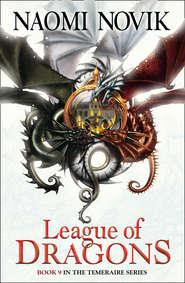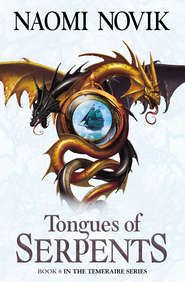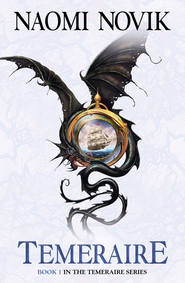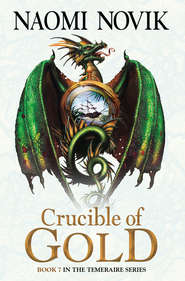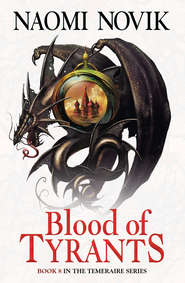По всем вопросам обращайтесь на: info@litportal.ru
(©) 2003-2024.
✖
Black Powder War
Автор
Год написания книги
2019
Настройки чтения
Размер шрифта
Высота строк
Поля
‘Even in a calm you could scarcely pull her any great distance,’ Laurence added consolingly. ‘A few miles may be of some use out in the open ocean, but at present we may as well stay in harbour, and be a little more comfortable; we would make very little speed even if we could get her out.’
‘It seems a great pity to me that we must always be waiting on the wind, when everything else is ready and we are also,’ Temeraire said. ‘I would so like to be home soon: there is so very much to be done.’ His tail thumped hollowly upon the boards, for emphasis.
‘I beg you will not raise your hopes too high,’ Laurence said, himself a little hopelessly: urging Temeraire to restraint had so far not produced any effect, and he did not expect a different event now. ‘You must be prepared to endure some delays; at home as much as here.’
‘Oh! I promise I will be patient,’ Temeraire said, and immediately dispelled any small notion Laurence might have had of relying upon this promise by adding, unconscious of any contradiction, ‘but I am quite sure the Admiralty will see the justice of our case very quickly. Certainly it is only fair that dragons should be paid, if our crews are.’
Having been at sea from the age of twelve onwards, before the accident of chance which had made him the captain of a dragon rather than a ship, Laurence enjoyed an extensive familiarity with the gentlemen of the Admiralty Board who oversaw the Navy and the Aerial Corps both, and a keen sense of justice was hardly their salient feature. The offices seemed rather to strip their occupants of all ordinary human decency and real qualities: creeping, nip-farthing political creatures, very nearly to a man. The very superior conditions for dragons here in China had forced open Laurence’s unwilling eyes to the evils of their treatment in the West, but as for the Admiralty’s sharing that view, at least so far as it would cost the country tuppence, he was not sanguine.
In any case, he could not help privately entertaining the hope that once at home, back at their post on the Channel and engaged in the honest business of defending their country, Temeraire might, if not give over his goals, then at least moderate them. Laurence could make no real quarrel with the aims, which were natural and just; but England was at war, after all, and he was conscious, as Temeraire was not, of the impudence in demanding concessions from their own Government under such circumstances: very like mutiny. Yet he had promised his support and would not withdraw it. Temeraire might have stayed here in China, enjoying all the luxuries and freedoms which were his birthright, as a Celestial. He was coming back to England largely for Laurence’s sake, and in hopes of improving the lot of his comrades-in-arms; despite all Laurence’s misgivings, he could hardly raise a direct objection, though it at times felt almost dishonest not to speak.
‘It is very clever of you to suggest we should begin with pay,’ Temeraire continued, heaping more coals of fire onto Laurence’s conscience; he had proposed it mainly for its being less radical a suggestion than many of the others which Temeraire had advanced, such as the wholesale demolition of quarters of London to make room for thoroughfares wide enough to accommodate dragons, and the sending of draconic representatives to address Parliament, which aside from the difficulty of their getting into the building would certainly have resulted in the immediate flight of all the human members. ‘Once we have pay, I am sure everything else will be easier. Then we can always offer people money, which they like so much, for all the rest; like those cooks which you have hired for me. That is a very pleasant smell,’ he added, not a non sequitur: the rich smoky smell of well-charred meat was growing so strong as to rise over the stench of the harbour.
Laurence frowned and looked down: the galley was situated directly below the dragondeck, and wispy ribbons of smoke, flat and wide, were seeping up from between the boards of the deck. ‘Dyer,’ he said, beckoning to one of his runners, ‘go and see what they are about, down there.’
Temeraire had acquired a taste for the Chinese style of dragon cookery which the British quartermaster, expected only to provide freshly butchered cattle, was quite unable to satisfy, so Laurence had found two Chinese cooks willing to leave their country for the promise of substantial wages. The new cooks spoke no English, but they lacked nothing in self-assertion; already professional jealousy had nearly brought the ship’s cook and his assistants to pitched battle with them over the galley stoves, and produced a certain atmosphere of competition.
Dyer trotted down the stairs to the quarterdeck and opened the door to the galley: a great rolling cloud of smoke came billowing out, and at once there was a shout and halloa of ‘Fire!’ from the lookouts up in the rigging. The watch-officer rang the bell frantically, the clapper scraping and clanging; Laurence was already shouting, ‘To stations!’ and sending his men to their fire crews.
All lethargy vanished at once, the sailors running for buckets, pails; a couple of daring fellows darted into the galley and came out dragging limp bodies: the cook’s mates, the two Chinese, and one of the ship’s boys, but no sign of the ship’s cook himself. Already the dripping buckets were coming in a steady flow, the bosun roaring and thumping his stick against the foremast to give the men the rhythm, and one after another the buckets were emptied through the galley doors. But still the smoke came billowing out, thicker now, through every crack and seam of the deck, and the bitts of the dragon-deck were scorching hot to the touch: the rope coiled over two of the iron posts was beginning to smoke.
Young Digby, quick-thinking, had organized the other ensigns: the boys were hurrying together to unwind the cable, swallowing hisses of pain when their fingers brushed against the hot iron. The rest of the aviators were ranged along the rail, hauling up water in buckets flung over the side and dousing the dragondeck: steam rose in white clouds and left a grey crust of salt upon the already warping planks, the deck creaking and moaning like a crowd of old men. The tar between the seams was liquefying, running in long black streaks along the deck with a sweet, acrid smell as it scorched and smoked. Temeraire was standing on all four legs now, mincing from one place to another for relief from the heat, though Laurence had seen him lie with pleasure on stones baked by the full strength of the midday sun.
Captain Riley was in and among the sweating, labouring men, shouting encouragement as the buckets swung back and forth, but there was an edge of despair in his voice. The fire was too hot, the wood seasoned by the long stay in harbour under the baking heat; and the vast holds were filled with goods for the journey home: delicate china wrapped in dry straw and packed in wooden crates, bales of silks, new-laid sailcloth for repairs. The fire had only to make its way four decks down, and the stores would go up in quick hot flames running all the way back to the powder magazine, and carry her all away.
The morning watch, who had been sleeping below, were now fighting to come up from the lower decks, open-mouthed and gasping with the smoke chasing them out, breaking the lines of water-carriers in their panic: though the Allegiance was a behemoth, her forecastle and quarterdeck could not hold her entire crew, not with the dragondeck nearly in flames. Laurence seized one of the stays and pulled himself up on the railing of the deck, looking for his crew among the milling crowd: most had already been out upon the dragondeck, but a handful remained unaccounted for: Therrows, his leg still in splints after the battle in Peking; Keynes, the surgeon, likely at his books in the privacy of his cabin; and he could see no sign of Emily Roland, his other runner: she was scarcely turned eleven, and could not easily have pushed her way out past the heaving, struggling men.
A thin, shrill kettle-whistle erupted from the galley chimneys, the metal cowls beginning to droop towards the deck, slowly, like flowers gone to seed. Temeraire hissed back in instinctive displeasure, drawing his head back up to all the full length of his neck, his ruff flattening against his neck. His great haunches had already tensed to spring, one foreleg resting on the railing. ‘Laurence, is it quite safe for you there?’ he called anxiously.
‘Yes, we will be perfectly well, go aloft at once,’ Laurence said, even as he waved the rest of his men down to the forecastle, concerned for Temeraire’s safety with the planking beginning to give way. ‘We may better be able to come at the fire once it has come up through the deck,’ he added, principally for the encouragement of those hearing him; in truth, once the dragondeck fell in, he could hardly imagine they would be able to put out the blaze.
‘Very well, then I will go and help,’ Temeraire said, and took to the air.
A handful of men less concerned with preserving the ship than their own lives had already lowered the jolly-boat into the water off the stern, hoping to make their escape unheeded by the officers engaged in the desperate struggle against the fire; they dived off in panic as Temeraire unexpectedly darted around the ship and descended upon them. He paid no attention to the men, but seized the boat in his talons, ducked it underwater like a ladle, and heaved it up into the air, dripping water and oars. Carefully keeping it balanced, he flew back and poured it out over the dragondeck: the sudden deluge went hissing and spitting over the planks, and tumbled in a brief waterfall over the stairs and down.
‘Fetch axes!’ Laurence called urgently. It was desperately hot, sweating work, hacking at the planks with steam rising and their axe blades skidding on the wet and tar-soaked wood, smoke pouring out through every cut they made. All struggled to keep their footing each time Temeraire deluged them once again; but the constant flow of water was the only thing that let them keep at their task, the smoke otherwise too thick. As they laboured, a few of the men staggered and fell unmoving upon the deck: no time even to heave them down to the quarterdeck, the minutes too precious to sacrifice. Laurence worked side by side with his armourer, Pratt, long thin trails of black-stained sweat marking their shirts as they swung the axes in uneven turns, until abruptly the planking cracked with gunshot sounds, a great section of the dragondeck all giving way at once and collapsing into the eager hungry roar of the flames below.
For a moment Laurence wavered on the verge, then his first lieutenant, Granby, was pulling him away. They staggered back together, Laurence half-blind and nearly falling into Granby’s arms; his breath would not quite come, rapid and shallow, and his eyes were burning. Granby dragged him partway down the steps, and then another torrent of water carried them in a rush the rest of the way, to fetch up against one of the forty-two-pounder carronades on the forecastle. Laurence managed to pull himself up the railing in time to vomit over the side, the bitter taste in his mouth still less strong than the acrid stink of his hair and clothes.
The rest of the men were abandoning the dragondeck, and now the enormous torrents of water could go straight down at the flames. Temeraire had found a steady rhythm, and the clouds of smoke were already less: black sooty water was running out of the galley doors onto the quarterdeck. Laurence felt queerly shaken and ill, heaving deep breaths that did not seem to fill his lungs. Riley was rasping out hoarse orders through the speaking trumpet, barely loud enough to be heard over the hiss of smoke; the bosun’s voice was gone entirely: he was pushing the men into rows with his bare hands, pointing them at the hatchways; soon there was a line organized, handing up the men who had been overcome or trampled below: Laurence was glad to see Therrows being lifted out. Temeraire poured another torrent upon the last smouldering embers; then Riley’s coxswain Basson poked his head out of the main hatch, panting, and shouted, ‘No more smoke coming through, sir, and the planks above the berth-deck ain’t worse than warm: I think she’s out.’
A heartfelt ragged cheer went up. Laurence was beginning to feel he could get his wind back again, though he still spat black with every coughing breath; with Granby’s hand he was able to climb to his feet. A haze of smoke like the aftermath of cannon-fire lay thickly upon the deck, and when he climbed up the stairs he found a gaping charcoal fire-pit in place of the dragondeck, the edges of the remaining planking crisped like burnt paper. The body of the poor ship’s cook lay like a twisted cinder among the wreckage, skull charred black and his wooden legs burnt to ash, leaving only the sad stumps to the knee.
Having let down the jolly-boat, Temeraire hovered above uncertainly a little longer and then let himself drop into the water beside the ship: there was nowhere left for him to land upon her. Swimming over and grasping at the rail with his claws, he craned up his great head to peer anxiously over the side. ‘You are well, Laurence? Are all my crew all right?’
‘Yes; I have made everyone,’ Granby said, nodding to Laurence. Emily, her cap of sandy hair speckled grey with soot, came to them dragging a jug of water from the scuttlebutt: stale and tainted with the smell of the harbour, and more delicious than wine.
Riley climbed up to join them. ‘What a ruin,’ he said, looking over the wreckage. ‘Well, at least we have saved her, and thank Heaven for that; but how long it will take before we can sail now, I do not like to think.’ He gladly accepted the jug from Laurence and drank deep before handing it on to Granby. ‘And I am damned sorry; I suppose all your things must be spoiled,’ he added, wiping his mouth: senior aviators had their quarters towards the bow, one level below the galley.
‘Good God,’ Laurence said, blankly, ‘and I have not the least notion what has happened to my coat.’
‘Four; four days,’ the tailor said in his limited English, holding up fingers to be sure he had not been misunderstood; Laurence sighed and said, ‘Yes, very well.’ It was small consolation to think that there was no shortage of time: two months or more would be required to repair the ship, and until then he and all his men would be cooling his heels on shore. ‘Can you repair the other?’
They looked together down at the coat which Laurence had brought him as a pattern: more black than bottle-green now, with a peculiar white residue upon the buttons and smelling strongly of smoke and salt water both. The tailor did not say no outright, but his expression spoke volumes. ‘You take this,’ he said instead, and going into the back of his workshop brought out another garment: not a coat, precisely, but one of the quilted jackets such as the Chinese soldiers wore, like a tunic opening down the front, with a short upturned collar.
‘Oh, well—’ Laurence eyed it uneasily; it was made of silk, in a considerably brighter shade of green, and handsomely embroidered along the seams with scarlet and gold: the most he could say was that it was not as ornate as the formal robes to which he had been subjected on prior occasions.
But he and Granby were to dine with the commissioners of the East India Company that evening; he could not present himself half-dressed, or keep himself swathed in the heavy cloak which he had put on to come to the shop. He was glad enough to have the Chinese garment when, returning to his new quarters on shore, Dyer and Roland told him there was no proper coat to be had in town for any money whatsoever: not very surprising, as respectable gentlemen did not choose to look like aviators, and the dark green of their broadcloth was not a popular colour in the Western enclave.
‘Perhaps you will set a new fashion,’ Granby said, somewhere between mirth and consolation; a lanky fellow, he was himself wearing a coat seized from one of the hapless midwingmen, who having been quartered on the lower decks had not suffered the ruin of their own clothes. With an inch of wrist showing past his coat sleeves and his pale cheeks as usual flushed with sunburn, he looked at the moment rather younger than his twenty years and six, but at least no one would look askance. Laurence, being a good deal more broad-shouldered, could not rob any of the younger officers in the same manner, and though Riley had handsomely offered, Laurence did not mean to present himself in a blue coat, as if he were ashamed of being an aviator and wished to pass himself off as still a naval captain.
He and his crew were now quartered in a spacious house set directly upon the waterfront, the property of a local Dutch merchant more than happy to let it to them and remove his household to apartments farther into the town, where he would not have a dragon on his doorstep. Temeraire had been forced by the destruction of his dragondeck to sleep on the beach, much to the dismay of the Western inhabitants; to his own disgust as well, the shore being inhabited by small and irritating crabs which persisted in treating him like the rocks in which they made their homes and attempting to conceal themselves upon him while he slept.
Laurence and Granby paused to bid him farewell on their way to the dinner. Temeraire, at least, approved Laurence’s new costume; he thought the shade a pretty one, and admired the gold buttons and thread particularly. ‘And it looks handsome with the sword,’ he added, having nosed Laurence around in a circle the better to inspect him: the sword in question was his very own gift, and therefore in his estimation the most important part of the ensemble. It was also the one piece for which Laurence felt he need not blush: his shirt, thankfully hidden beneath the coat, not all the scrubbing in the world could save from disgrace; his breeches did not bear close examination; and as for his stockings, he had resorted to his tall Hessian boots.
They left Temeraire settling down to his own dinner under the protective eyes of a couple of midwingmen and a troop of soldiers under the arms of the East India Company, part of their private forces; Sir Thomas Staunton had loaned them to help guard Temeraire not from danger but overenthusiastic well-wishers. Unlike the Westerners who had fled their homes near the shore, the Chinese were not alarmed by dragons, living from childhood in their midst, and the tiny handful of Celestials so rarely left the Imperial precincts that to see one, and better yet to touch, was counted an honour and an assurance of good fortune.
Staunton had also arranged this dinner by way of offering the officers some entertainment and relief from their anxieties over the disaster, unaware that he would be putting the aviators to such desperate shifts in the article of clothing. Laurence had not liked to refuse the generous invitation for so trivial a reason, and had hoped to the last that he might find something more respectable to wear; now he came ruefully prepared to share his travails over the dinner table, and bear the amusement of the company.
His entrance was met with a polite if astonished silence, at first; but he had scarcely paid his respects to Sir Thomas and accepted a glass of wine before murmurs began. One of the older commissioners, a gentleman who liked to be deaf when he chose, said quite clearly, ‘Aviators and their starts; who knows what they will take into their heads next,’ which made Granby’s eyes glitter with suppressed anger; and a trick of the room made some less consciously indiscreet remarks audible also.
‘What do you suppose he means by it?’ inquired Mr. Chatham, a gentleman newly arrived from India, while eyeing Laurence with interest from the next window over; he was speaking in low voices with Mr. Grothing-Pyle, a portly man whose own interest was centred upon the clock, and in judging how soon they should go in to dinner.
‘Hm? Oh; he has a right to style himself an Oriental prince now if he likes,’ Grothing-Pyle said, shrugging, after an incurious glance over his shoulder. ‘And just as well for us too. Do you smell venison? I have not tasted venison in a year.’
Laurence turned his own face to the open window, appalled and offended in equal measure. Such an interpretation had never even occurred to him; his adoption by the Emperor had been purely and strictly pro forma, a matter of saving face for the Chinese, who had insisted that a Celestial might not be companion to any but a direct connection of the Imperial family; while on the British side it had been eagerly accepted as a painless means of resolving the dispute over the capture of Temeraire’s egg. Painless, at least, to everyone but Laurence, already in possession of one proud and imperious father, whose wrathful reaction to the adoption he anticipated with no small dismay. True, that consideration had not stopped him: he would have willingly accepted anything short of treason to avoid being parted from Temeraire. But he had certainly never sought or desired so signal and queer an honour, and to have men think him a ludicrous kind of social climber, who should value Oriental titles above his own birth, was deeply mortifying.
The embarrassment closed his mouth. He would have gladly shared the story behind his unusual clothing as an anecdote; as an excuse, never. He spoke shortly in reply to the few remarks offered him; anger made him pale and, if he had only known it, gave his face a cold, forbidding look, almost dangerous, which made conversation near him die down. He was ordinarily good-humoured in his expression, and though he was not darkly tanned, the many years labouring in the sun had given his looks a warm bronzed cast; the lines upon his face were mostly smiling: all the more contrast now. These men owed if not their lives, at least their fortunes to the success of the diplomatic mission to Peking, whose failure would have meant open warfare and an end to the China trade, and whose success had cost Laurence a blood-letting and the life of one of his men; he had not expected any sort of effusive thanks and would have spurned them if offered, but to meet with derision and incivility was something entirely different.
‘Shall we go in?’ Sir Thomas said, sooner than usual, and at the table he made every effort to break the uneasy atmosphere which had settled over the company: the butler was sent back to the cellar a half-dozen times, the wines growing more extravagant with each visit, and the food was excellent despite the limited resources accessible to Staunton’s cook: among the dishes was a very handsome fried carp, laid upon a ragout of the small crabs, now victims in their turn, and for centrepiece a pair of fat haunches of venison roasted, accompanied by a dish full of glowing jewel-red currant jelly.
The conversation flowed again; Laurence could not be insensible to Staunton’s real and sincere desire to see him and all the company comfortable, and he was not of an implacable temper to begin with; still less when encouraged with the best part of a glorious burgundy just come into its prime. No one had made any further remarks about coats or imperial relations, and after several courses, Laurence had thawed enough to apply himself with a will to a charming trifle assembled out of Naples biscuits and sponge-cake, with a rich brandied custard flavoured with orange, when a commotion outside the dining room began to intrude, and finally a single piercing shriek, like a woman’s cry, interrupted the increasingly loud and slurred conversation.
Silence fell, glasses stopped in mid-air, some chairs were pushed back; Staunton rose, a little wavering, and begged their pardon. Before he could go to investigate, the door was thrust abruptly open, Staunton’s anxious servant stumbling back into the room still protesting volubly in Chinese. He was gently but with complete firmness being pressed aside by another Oriental man, dressed in a padded jacket and a round, domed hat rising above a thick roll of dark wool; the stranger’s clothing was dusty and stained yellow in places, and not much like the usual native dress, and on his gauntleted hand perched an angry-looking eagle, brown and golden feathers ruffled up and a yellow eye glaring; it clacked its beak and shifted its perch uneasily, great talons puncturing the heavy block of padding.
When they had stared at him and he at them in turn, the stranger further astonished the room by saying, in pure drawing-room accents, ‘I beg your pardon, gentlemen, for interrupting your dinner; my errand cannot wait. Is Captain William Laurence here?’
Laurence was at first too bemused with wine and surprise to react; then he rose and stepped away from the table, to accept a sealed oilskin packet under the eagle’s unfriendly stare. ‘I thank you, sir,’ he said. At a second glance, the lean and angular face was not entirely Chinese: the eyes, though dark and faintly slanting, were rather more Western in shape, and the colour of his skin, much like polished teak wood, owed less to nature than to the sun.
The stranger inclined his head politely. ‘I am glad to have been of service.’ He did not smile, but there was a glint in his eye suggestive of amusement at the reaction of the room, which he was surely accustomed to provoking; he threw the company all a final glance, gave Staunton a small bow, and left as abruptly as he had come, going directly past a couple more of the servants who had come hurrying to the room in response to the noise.
‘Pray go and give Mr. Tharkay some refreshment,’ Staunton said to the servants in an undertone and sent them after him; meanwhile Laurence turned to his packet. The wax had been softened by the summer heat, the impression mostly lost, and the seal would not easily come away or break, pulling like soft candy and trailing sticky threads over his fingers. A single sheet within only, written from Dover in Admiral Lenton’s own hand, and in the abrupt style of formal orders: a single look was enough to take it in
… and you are hereby required without the loss of a Moment to proceed to Istanbul, there to receive by the Offices of Avraam Maden, in the service of H. M. Selim III, three Eggs now through agreement the Property of His Majesty’s Corps, to be secured against the Elements with all due care for their brooding and thence delivered straightaway to the charge of those Officers appointed to them, who shall await you at the covert at Dunbar …
The usual grim epilogues followed, herein neither you nor any of you shall fail, or answer the contrary at your peril; Laurence handed the letter to Granby, then nodded to him to pass the letter to Riley and to Staunton, who had joined them in the privacy of the library.
‘Laurence,’ Granby said, after handing it on, ‘we cannot sit here waiting for repairs with a months-long sea journey after that; we must get going at once.’






